John Janaro's Blog, page 201
November 22, 2017
Thank God For MUSIC
Happy St Cecilia's Day! Thank God for MUSIC.
Published on November 22, 2017 20:32
November 21, 2017
Power, Progress, and the Drama of Freedom
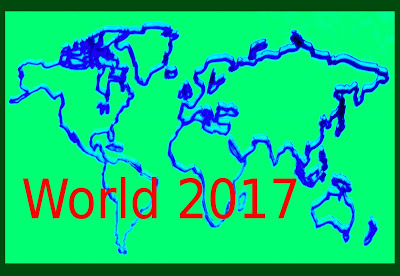 Today's world remains a world in search of progress. People insist on the imperative to build a more just and equitable society, in which the dignity of the human person is respected and diverse social and cultural contexts of human community are appreciated and fostered. Recent centuries, in all of their complexity and in spite of tragic setbacks and enormous evils, have also left us a magnificent legacy of material and human progress.
Today's world remains a world in search of progress. People insist on the imperative to build a more just and equitable society, in which the dignity of the human person is respected and diverse social and cultural contexts of human community are appreciated and fostered. Recent centuries, in all of their complexity and in spite of tragic setbacks and enormous evils, have also left us a magnificent legacy of material and human progress.We are equipped with this outstanding power to manipulate the material world to serve human purposes and to access and exchange information in unprecedented ways. But though we have a sense that the human race is supposed to "move forward" by using wisely this legacy of power, we are increasingly perplexed as to how this movement should proceed.
There is a kind of "movement of history," but it isn't the simple playing out of some predetermined scientific laws of evolution. Human beings are far from being so easily explained or contained. In fact, the natural progress (the essential movement) of human history involves the unfolding of the potential for humans to interact with the world and one another.
Here there has indeed been "progress" which we must acknowledge. Our power to act has grown, but it remains in the hands of our freedom, which means that just as we have become capable of doing greater and more wide-reaching good in the world, we have also become capable of doing worse, more widespread, more devastating and more monstrous evil. The challenge for humans today is to use our power and understanding to serve the good, and this means perceiving and living our relationship to transcendence, to the destiny of the human heart, to infinite beauty, in a much more profound and intense way than we have in the past.
Christians naturally believe that the only way to meet this challenge is with a deeper integration of faith throughout the whole of life, a larger "opening up" to the transforming presence of Christ's love through our willingness to engage the vast array of circumstances and problems that human beings (i.e. all of us) face today. This, of course, can only happen if each of us is willing to grow in our relationship with Jesus. Following Jesus means seeking eternal life first, recognizing that our present life—with all of its purposes and hopes and good things—is the path we travel toward fulfillment in Him.
But Jesus also promises "a hundredfold in this life" to those who follow Him (not, however, without "persecutions"—see Mark 10:30). The journey to God entails an attention to the road (while not being reduced to only that), and this attention—rightly given—does endeavor to make the road of this world a better, more beautiful, more human place.
The unprecedented power we possess and the scope of the problems we face in the world today do not mean that we should ignore those who struggled to try to build Christian or religious-inspired civilizations in previous times. We can learn from their achievements and mistakes (carrying forth all that was true, good, and beautiful without nostalgia for a golden age that never existed). But because the Kingdom of God "is not of this world," human history, even historical progress, is always ambivalent. Evil and its "persecutions" continue to prey upon the good.
And as we have said, material progress and the gigantic development of the scope of human power means that our capacity for good or evil has become more dramatic. Christians need a deepening of the awareness of faith that faces the drama of freedom inherent in the challenges of our time and adheres with greater love to the mysterious working of God's grace in the world. The Second Vatican Council was a beginning of that deeper faith and adherence for the Catholic Church, but the Church's members, like everyone in the world and history, are weeds and wheat all growing together, so there is no neat "program" here either. There is no theory that can resolve and thus spare us from the drama of living the life given to us with trust in the mystery of God's love.
God will not fail us. His grace will be sufficient and abundant for us to attain our destiny, and also to inform our vast power in this world with the patience, kindness, and non-violence of Christian love (see 1 Corinthians 13). Let us not fail to adhere to Him in trust and perseverance.
Of course we will forget. We will make mistakes. But let us remember to get up again, and to return to the Lord whose love is always enough to heal us and empower us to give Him glory, build up the good, and cooperate with Him in the work He is already accomplishing, mysteriously, in the hearts of our neighbors, in the heart of every person. He is the Lord of history who draws all things to Himself.
Published on November 21, 2017 20:11
November 19, 2017
Remaining in Him
 Jesus said: "Just as a branch cannot bear fruit on its own unless it remains on the vine, so neither can you unless you remain in me.
Jesus said: "Just as a branch cannot bear fruit on its own unless it remains on the vine, so neither can you unless you remain in me."I am the vine, you are the branches. Whoever remains in me and I in him will bear much fruit, because without me you can do nothing.
"Anyone who does not remain in me will be thrown out like a branch and wither; people will gather them and throw them into a fire and they will be burned.
"If you remain in me and my words remain in you, ask for whatever you want and it will be done for you. By this is my Father glorified, that you bear much fruit and become my disciples" (John 15:4-8).
Published on November 19, 2017 15:53
November 17, 2017
Prayer for a Friday
Prayer for a Friday:
Jesus, on the Cross you wholly embraced every person. You have given yourself with an infinite ineffable totality, and you alone understand the mystery of every person, because your emptying of yourself has made "room" for every person in your Heart.
Guide our steps, Lord. Draw us to yourself. Draw us by the inexhaustible beauty and goodness of this total gift of your love for us.
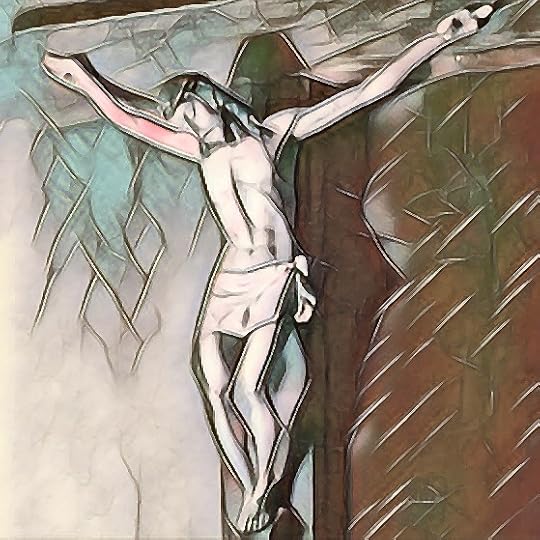
Jesus, on the Cross you wholly embraced every person. You have given yourself with an infinite ineffable totality, and you alone understand the mystery of every person, because your emptying of yourself has made "room" for every person in your Heart.
Guide our steps, Lord. Draw us to yourself. Draw us by the inexhaustible beauty and goodness of this total gift of your love for us.

Published on November 17, 2017 20:13
November 16, 2017
A Great Woman Named Gertrude
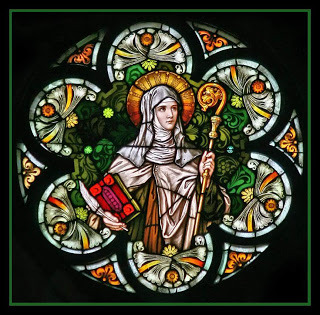 Today the Roman calendar celebrates the remarkable Saint Gertrude of Helfta, a medieval woman who made a powerful impression on German Thuringia two centuries before the birth of Luther. She gave energy and warmth to the evangelical (i.e. "Gospel"-focused, Christ-centered) Catholic reform movement that spread through Western Europe in the 12th and 13th centuries.
Today the Roman calendar celebrates the remarkable Saint Gertrude of Helfta, a medieval woman who made a powerful impression on German Thuringia two centuries before the birth of Luther. She gave energy and warmth to the evangelical (i.e. "Gospel"-focused, Christ-centered) Catholic reform movement that spread through Western Europe in the 12th and 13th centuries.Known to history as St Gertrude the Great, she takes her place among those whose whose labor gave shape to the Christian ideal in the High Middle Ages, with Bernard and Hildegarde, Dominic, Francis, and Clare, Bonaventure and Thomas Aquinas. As a 13th century Benedictine nun in a prominent monastery, Gertrude was a scholar and spiritual writer whose reputation for holiness drew many in the Church and the world to seek her counsel.
However, she was above all a child of God, a true Christian mystic enraptured by the merciful and loving heart of Jesus.
In one of the visions she recounted, Jesus said to her, "My Divine Heart, understanding human inconstancy and frailty, desires with incredible ardor continually to be invited, either by your words, or at least by some other sign, to operate and accomplish in you what you are not able to accomplish yourself. And as its omnipotence enables it to act without trouble, and its impenetrable wisdom enables it to act in the most perfect manner, so also its joyous and loving charity makes it ardently desire to accomplish this end."
Published on November 16, 2017 19:23
November 14, 2017
Friends of God, at My Side
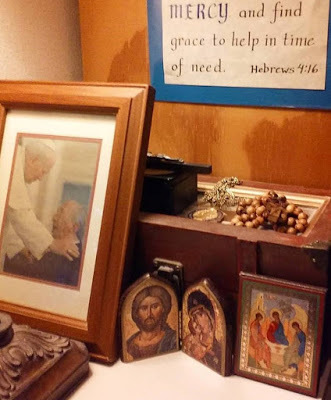 At my bedside I have an area that's a little bit like what the Byzantine tradition calls a "beautiful corner." It's not formal, and I don't have an icon lamp. It's just a help to remember the Lord and to pray.
At my bedside I have an area that's a little bit like what the Byzantine tradition calls a "beautiful corner." It's not formal, and I don't have an icon lamp. It's just a help to remember the Lord and to pray.Here in this picture are some of the things I see when I open my eyes in the morning, or when I am constrained in bed by my own sickness and turmoil of mind and body:
Right to left, a small Russian icon of the Trinity, icons of Jesus and Mary, and precious photo of my two "spiritual fathers" who still guide me from their place before God as I continue to journey with Jesus along the road they helped me to embark upon: Pope Saint John Paul II and the Servant of God Msgr Luigi Giussani.
Behind is a box that has relics in it (including the Blessed martyrs of Thailand!) and you can see above part of a Psalm verse that my wonderful wife wrote out for me in calligraphy.
Catholic Christianity is well-traveled path to our destiny, with many deeply trodden and tested places where we can put our foot for the next step.
We also have many companions from every time and place to inspire us and help us.
Published on November 14, 2017 09:39
November 13, 2017
Francesca Cabrini: Mercy Fills the Earth
The first American citizen to be canonized (she was born in Italy) was Francesca Cabrini (1850-1917), and she was a boss! Great lady, dedicated to the poor and especially those who came to the New World in such large numbers in the late 19th-early 20th centuries.
Immigrants of those days loved "Mother Cabrini," who took care of them and showed them the face of Jesus.
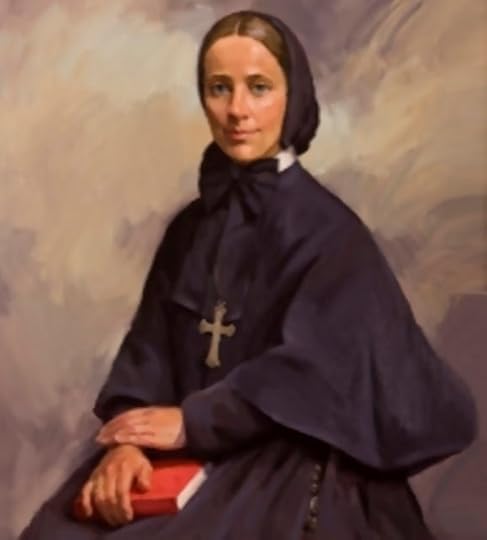
Immigrants of those days loved "Mother Cabrini," who took care of them and showed them the face of Jesus.
"Prayer is powerful! It fills the earth with mercy, it makes the Divine clemency pass from generation to generation; right along the course of the centuries wonderful works have been achieved through prayer" (Saint Francesca ["Frances"] Cabrini, feast November 13).

Published on November 13, 2017 11:12
November 12, 2017
Loving Sinners, Beginning With Myself
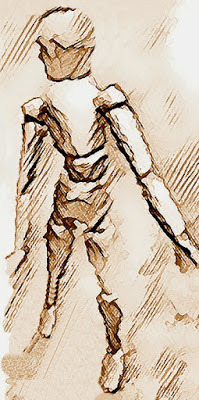 Here is a common maxim: "Love the sinner, hate the sin."
Here is a common maxim: "Love the sinner, hate the sin."We do run up against certain limits with this way of speaking. If I say this, it would be so easy for me to implicitly (and perhaps subconsciously) to mean something like, "love that person over there who, unlike me, is a 'sinner'!"
But what I really need is sorrow for my own sins, and sorrow for the suffering caused by sin in the world, in my own life and in the lives of others. And I need to turn to Jesus on the Cross, because crucified love is God's answer to sin and the hope of sinners.
Of course anger and aversion (i.e. "hate") are natural emotions that spontaneously arise in us as a response to evil and destructive things, as is fear. In human beings these emotions are out of whack. Even after baptism, Christians suffer emotional dysfunctionality because of the lingering range of effects of original sin. These involve not only difficulty in integrating the moral life but also the overall weakness of bodily humanity, which includes the whole misshapen neuropsychiatric "package" that we struggle with in various ways and to varying degrees.
To govern our own emotions so that they serve as a constructive energy within an integrated human response to life is a goal (in different ways) of psychological health and the cultivation of virtue (most proximately fortitude and temperance). Here perhaps we can learn some human wisdom from the discipline of nonviolence (which is anything but an escape from the struggle against evil).
We also need to recognize that "bad tempered" people (psychologically) are capable of real love (personal and moral), and that "nice" people (psychologically, again) can misuse the word and pretend the attitude of "tolerance" as a pretext for sinking into an isolated, loveless indifference.
In any case, the struggle always begins with myself. I can always reform, change, purify, and grow. I don't even know how to live from this awareness, but I know it's necessary for a real and fruitful engagement of life. It therefore brings me back to prayer, to begging for mercy.
Jesus have mercy on me, a sinner.
Published on November 12, 2017 20:58
November 10, 2017
"We Conquer as He Conquered"

"By the Lord's example
the faithful were called upon to believethat—although there ought not to be any doubt about the promises of happiness—yet we should understand that amidst the trials of this life we must ask for the power of endurance...because the joyousness of reigning cannot precede the times of suffering....
"Let all people's faith then be established, according to the preaching of the most holy gospel, and let no one be ashamed of Christ's cross, through which the world was redeemed. And let not any one fear to suffer for righteousness' sake, or doubt of the fulfillment of the promises, for this reason: that through toil we pass to rest and through death to life; since all the weakness of our humility was assumed by Him, in whom, if we abide in the acknowledgment and love of Him, we conquer as He conquered, and receive what He promised."
~ Saint Leo the Great, Sermon 51
Published on November 10, 2017 20:07
November 8, 2017
A Hundred Years Ago: An "October" Revolution?
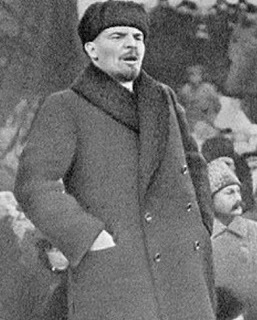 Meet the New Boss."To the citizens of Russia. The Provisional Government has been deposed.
Meet the New Boss."To the citizens of Russia. The Provisional Government has been deposed."State power has passed into the hands of the organ of the Petrograd Soviet of Workers' and Soldiers' Deputies, the Military Revolutionary Committee, which heads the Petrograd proletariat and garrison.
"The cause for which the people have fought—namely, the immediate offer of a democratic peace, workers' control over production, and the establishment of Soviet power—has been secured.
"Long live the revolution of soldiers, workers, and peasants!"
(V. I. Lenin, November 7, 1917)
So declared a 47 year old recently returned expatriate during a important meeting of representatives of the revolutionary "unions" ("soviets") that were buttressing Russia's "provisional government" that had overthrown the Tsar back in March, a hundred years ago.
The statement that would shape the myth of "the October Revolution" for generations after, however, was something of a myth even as Lenin said it at around 3:00 in the afternoon on that famous day. Ministers of the provisional government remained holed up at the Winter Palace, which was not taken by Lenin's comrades until early the following morning.
The coup that would mark the official entry of Communism into political power—a power that would be wielded despotically and murderously over millions of people within a generation—was still in progress. Nevertheless, Lenin calculated that a statement was necessary in order to seize the moment. He wasn't very picky about things like telling the truth.
In fact, it would take days, weeks, even months to consolidate this bold power grab, and then several years of bloody civil war to make it stick. But eventually Communism would have its Red October, even after Russia's adoption of the Western calendar changed the anniversary date from October 25 (the Julian calendar in use at the time) to November 7 (the date on the Gregorian calendar).
If you were English speaking (or reading) a hundred years ago, no one would have expected you to realize that on the morning of November 8, 1917 history was being made. Suppose you were in London: you would have picked up your copy of The Times or The Daily Telegraph, sipped your tea, and wondered how things were going with the War, what the Irish were up to, or who was going to perform at the Royal Albert Hall the coming weekend.
Except for the last of these, you wouldn't have found much information on the "front page." The newspaper, which was the main form (indeed the only form) of daily media distraction back then, was a blizzard of printed information:

Ten pages for a penny. Full of print. The meaty news of the doings on the continent was on page five:

Oh my, did we have lots going on in the Fall of 1917! This is a grisly page.
Italy was taking a beating from the Germans on its front (columns 1 and 7 are indicating that the Battle of Caporetto was in full swing). The British were making their move in Palestine (this would have been Ottoman territory—the borders of today's Middle East would be carved out from the defeated Turkish Empire after this war). Thus we see the middle column (i.e. column 4).
Meanwhile, column 2 points to the final days of the three month long British and Canadian offensive in Flanders, known to history as the Battle of Passchendaele. At the cost of some half a million casualties, the Western front got pushed back about five miles. Yes, it was more of the usual insanity, but Germany was bleeding faster at this stage of the war, and the Allies were trying to make the most of the sheer attrition factor.
Germany needed a break.
You couldn't be blamed for not realizing that the news in column 5 was the beginning of a big break for the Kaiser and his legions. Few people imagined that it was destined to have so much significance for the future. The headline says "Extremist Rising in Petrograd. State Buildings Seized" (I have added the red highlighter here, for people a hundred years later, to make sure it stands out from all the small print).
But to continue our imaginative supposition: by now you, the English newspaper reader of 1917, would have been used to hearing all sorts of crazy news from Russia since the downfall of the Tsar. How was anyone supposed to keep track of who was in charge and who was rioting? The only thing that seemed to matter was that Russia was still in the war, tying down 50 divisions of Germans (several hundred thousand men) in the East.
Mr. Lenin, however, had a plan to get your attention. Recall the line in his statement about "the immediate offer of a democratic peace." Germany had put Lenin on a train from Switzerland to Russia in April, probably thinking he was mad as a hatter but willing to take him up on his promises to stir up trouble.
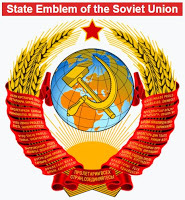 Looks pretty "Maximal" to me.Ultimately they got a lot more trouble than they bargained for, but in November 1917 it was looking like a great deal for the Germans. Being a good Brit, of course, you might have been perplexed by all of this as you chewed your biscuit and read about this faction that called itself the "Maximalists" (or at least this was the translation your paper used for the word Bolsheviks at the time).
Looks pretty "Maximal" to me.Ultimately they got a lot more trouble than they bargained for, but in November 1917 it was looking like a great deal for the Germans. Being a good Brit, of course, you might have been perplexed by all of this as you chewed your biscuit and read about this faction that called itself the "Maximalists" (or at least this was the translation your paper used for the word Bolsheviks at the time).On November 8, it wasn't even clear to the London press what the outcome of the "Extremist Rising" was going to be. Though Lenin had already declared the provisional government "deposed," the English press wasn't convinced yet. They may not have even been aware of his brash declaration.
Nevertheless, the special correspondent for the Telegraph had what would prove to be a frightfully accurate awareness of what Lenin and his Bolsheviks represented in those early days of the Communist Revolution. In retrospect, a lot of the horrors of the twentieth century are predicted in his words, not only for Russia but for every place where Communism took hold.
It's worth the effort of squinting a bit to read these paragraphs now, a hundred years later:
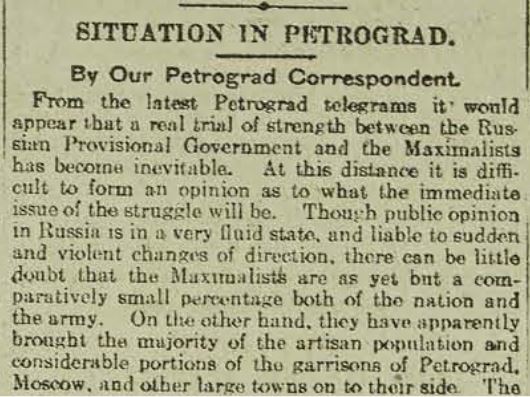

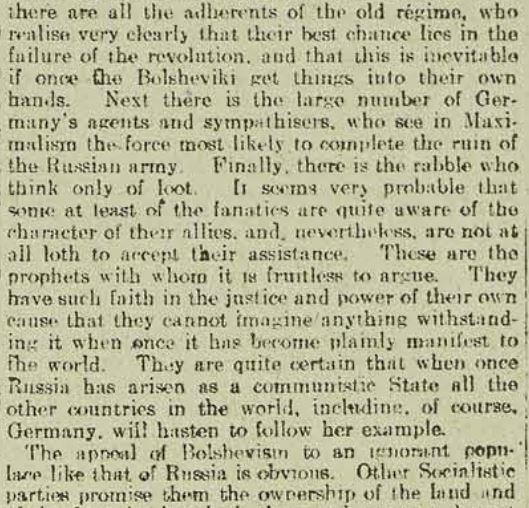
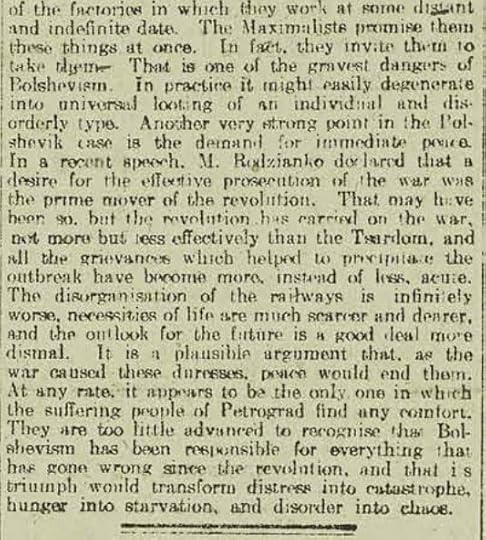
Published on November 08, 2017 20:00



